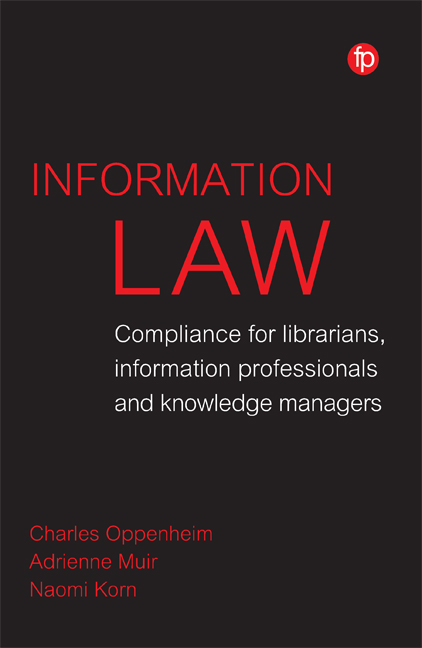Book contents
- Frontamtter
- Contents
- List of Acronyms
- List of Figures and Tables
- List of Case Studies
- Introduction
- 1 Copyright and Related Rights
- 2 Data Protection
- 3 Freedom of Information
- 4 Governance, Audits and Risk Assessment
- 5 Policies
- 6 Procedures: Copyright and Related Rights
- 7 Procedures: Using and Negotiating Licences for Access to Information Resources
- 8 Procedures: Data Protection and Freedom of Information
- 9 Tools and Templates
- 10 Awareness and Engagement
- 11 Some Speculations About the Future
- Appendix 1 Carrying out an Information Asset Audit
- Appendix 2 Sample IP Policy
- Appendix 3 Sample Data Protection Policy
- Appendix 4 Possible Contractual Terms for Online Access to Database Service
- Appendix 5 Data Protection Privacy Notice Template
- Bibliography
- Index
Appendix 2 - Sample IP Policy
Published online by Cambridge University Press: 29 July 2020
- Frontamtter
- Contents
- List of Acronyms
- List of Figures and Tables
- List of Case Studies
- Introduction
- 1 Copyright and Related Rights
- 2 Data Protection
- 3 Freedom of Information
- 4 Governance, Audits and Risk Assessment
- 5 Policies
- 6 Procedures: Copyright and Related Rights
- 7 Procedures: Using and Negotiating Licences for Access to Information Resources
- 8 Procedures: Data Protection and Freedom of Information
- 9 Tools and Templates
- 10 Awareness and Engagement
- 11 Some Speculations About the Future
- Appendix 1 Carrying out an Information Asset Audit
- Appendix 2 Sample IP Policy
- Appendix 3 Sample Data Protection Policy
- Appendix 4 Possible Contractual Terms for Online Access to Database Service
- Appendix 5 Data Protection Privacy Notice Template
- Bibliography
- Index
Summary
Definitions
Commercial Use Reproducing a work in any manner that is primarily intended for or directed toward commercial advantage or monetary compensation.
Crown Copyright Works deposited with the organisation that have been produced for or on behalf of the Crown.
Infringement Any unauthorised use of material, which is protected by copyright and/or any other related right, for which permission to use, has not been obtained. Infringements can occur in print and/or digital form.
Intellectual Property Rights (IPR/IP) All patents, Trade Marks, trade names and domain names, service marks, rights to inventions, copyright and related rights, rights in get-up, rights in goodwill, unfair competition rights, rights in designs (whether held in physical or electronic format or otherwise howsoever), database rights, rights in confidential information (including know-how and trade secrets) and any other intellectual property rights, in each case whether registered or unregistered and including all applications (and rights to apply) for, and renewal or extensions of, such rights and similar or equivalent rights or forms of protection in any part of the world.
Non-commercial Use Reproducing a work in any manner that is not primarily intended for or directed toward commercial advantage or monetary compensation.
Orphan Works Works that are in copyright, but where the owners of any third-party rights are either unknown or cannot be traced.
Third-Party Rights Intellectual property rights, not owned by the organisation.
Works Items, objects and/or collections and/or content, both accessioned and support collections. It also applies to any assets created by the organisation's staff and/or anyone else working for, or on behalf of the organisation and/or involving the organisation.
Introduction
The organisation owns, creates, commissions, loans, acquires, has deposited and uses a wide range of Works. Intellectual Property Rights (IPR) protects many of these. This document sets out the organisation's policy regarding the use, access to and management of these IPR. It includes IPR owned by the organisation, as well as any IPR vesting in the organisation's Works for which a third party might own the IPR.
This Policy outlines a framework under which the organisation, its staff and those working for or on behalf of the organisation should operate to ensure legal compliance, reduce the organisation's exposure to risks and work in accordance with robust ethical and reputational imperatives. Moreover, adherence to this Policy supports the achievement of the organisation's strategic objectives.
- Type
- Chapter
- Information
- Information LawCompliance for Librarians, Information Professionals and Knowledge Managers, pp. 159 - 166Publisher: FacetPrint publication year: 2020

